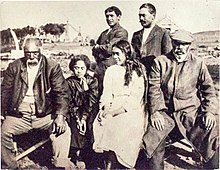
Back الموريوري Arabic Марыоры Byelorussian Morioris Catalan Moriorové Czech Moriori German Μοριορί Greek Moriori Spanish Moriorit Finnish Moriori French Pobo moriori Galician
 Moriori family, c. 1910 | |
| Total population | |
|---|---|
| approx. 1,000 (2018 census)[1] | |
| Regions with significant populations | |
| Chatham Islands | 36 (2013 census)[2] |
| North Island | 354 (2013 census)[2] |
| South Island | 348 (2013 census)[2] |
| Languages | |
| English, Māori, formerly Moriori | |
| Religion | |
| Christianity including Rātana[2] | |
| Related ethnic groups | |
| Māori people, other Polynesian peoples, Austronesian peoples | |
The Moriori are the indigenous Polynesian people of the Chatham Islands (Rēkohu in Moriori; Wharekauri in Māori), New Zealand. Moriori originated from Māori settlers from the New Zealand mainland around 1500 CE.[3] This was near the time of the shift from Archaic to Classic Māori culture on the main islands of New Zealand.[4][5] Oral tradition records multiple waves of migration to the Chatham Islands, starting in the 16th century.[6][7] Over several centuries these settlers' culture diverged from mainland Māori, developing a distinctive language (which started as a dialect but gradually became only partially mutually intelligible with Māori), mythology, artistic expression and way of life.[8] Currently there are around 700 people who identify as Moriori, most of whom no longer live on the Chatham Islands.[9] During the late 19th century some prominent anthropologists mistakenly proposed that Moriori were pre-Māori settlers of mainland New Zealand, and possibly Melanesian in origin.[10][11] In the 20th century, these pseudohistorical claims were later pushed aggressively by a handful of influential Pākehā historians to deny Māori indigeneity,[12] and are today commonly regarded as negationism.[13][14]
Early Moriori formed tribal groups based on eastern Polynesian social customs and organisation. Later, a prominent pacifist culture emerged; this was known as the law of nunuku, based on the teachings of the 16th century Moriori leader Nunuku-whenua.[15] This culture made it easier for Taranaki Māori invaders to nearly exterminate them in the 1830s during the Musket Wars. This was the Moriori genocide, in which the Moriori were either murdered or enslaved by members of the Ngāti Mutunga and Ngāti Tama iwi,[16] killing or displacing nearly 95% of the Moriori population.
The Moriori, however, were not extinct, and gained aroha and recognition as New Zealand's second indigenous people during the next century. Their culture and language underwent a revival, and Moriori names for their islands were prioritised. In February 2020, the New Zealand government signed a treaty with tribal leaders, giving them rights enshrined in law and the Moriori people at large an apology, returning stolen remains of those killed in the genocide, and gifting NZD$18 million in reparations.[17][18] On 23 November 2021, the New Zealand government enshrined in law the treaty between Moriori and the Crown.[19] The law is called the Moriori Claims Settlement Bill. It includes an agreed summary history that begins with the words "Moriori karāpuna (ancestors) were the waina-pono (original inhabitants) of Rēkohu, Rangihaute, Hokorereoro (South East Island), and other nearby islands (making up the Chatham Islands). They arrived sometime between 1000 and 1400 CE."[20]
- ^ Cite error: The named reference
2018populationwas invoked but never defined (see the help page). - ^ a b c d "Moriori Population and Geography". stats.govt.nz. Statistics New Zealand. Archived from the original on 7 March 2016. Retrieved 5 March 2016.
- ^ Davis, Denise; Solomon, Māui (8 February 2005). "Moriori – Origins of the Moriori people". Te Ara: The Encyclopedia of New Zealand. Retrieved 5 October 2020.
- ^ Anderson, Atholl (2016). "The making of the Maori middle ages". Journal of New Zealand Studies (23): 2.
- ^ Barber, Ian. "Constructions Of Change: A History Of Early Maori Culture Sequences". Journal of the Polynesian Society. 104 (4): 357–396. Retrieved 13 December 2018.
- ^ Davis, Denise; Solomon, Māui (8 February 2005). "Moriori – The migrations from Hawaiki". Te Ara: The Encyclopedia of New Zealand. Retrieved 5 October 2020.
- ^ Richards 2018, pp. 73–76.
- ^ Seymour, Maud Ella (1924). A history of the Chatham Islands (M.A.). University of Canterbury.
- ^ Davis, Denise; Solomon, Māui (8 February 2005). "Moriori – Facts and figures". Te Ara: The Encyclopedia of New Zealand. Retrieved 5 October 2020.
- ^ Cite error: The named reference
Blankwas invoked but never defined (see the help page). - ^ Shapiro, HL (1940). "The physical anthropology of the Maori-Moriori". The Journal of the Polynesian Society. 49 (1(193)): 1–15. JSTOR 20702788.
- ^ Anderson, Atholl (November 2014). Tangata Whenua: An Illustrated History (1st ed.). Auckland: Auckland War Memorial Museum. pp. Chapter Two, 59–65. ISBN 9781927131411.
{{cite book}}: CS1 maint: date and year (link) - ^ Rebecca Quilliam (27 December 2012). "Historians rubbish claims of academic conspiracy". The New Zealand Herald.
- ^ Doyle, Jacob (17 June 2020). "The Moriori myth has enabled racism against Māori in Aotearoa for generations". Stuff. Retrieved 8 March 2023.
- ^ King 2000, pp. 26, 177.
- ^ Rekohu: A Report on Moriori and Ngati Mutunga Claims in the Chatham Islands (PDF). Waitangi Tribunal Report. 2001.
- ^ "Moriori Culture". www.virtualoceania.net. Retrieved 28 February 2021.
- ^ "After more than 150 years, New Zealand recognises 'extinct' Moriori people". the Guardian. 14 February 2020. Retrieved 28 February 2021.
- ^ Corlett, Eva (26 November 2021). "Long fight for justice ends as New Zealand treaty recognises Moriori people". The Guardian. Retrieved 26 November 2021.
- ^ Government of New Zealand (23 November 2021). "Moriori Claims Settlement Bill". New Zealand legislation. Retrieved 26 November 2021.
© MMXXIII Rich X Search. We shall prevail. All rights reserved. Rich X Search
